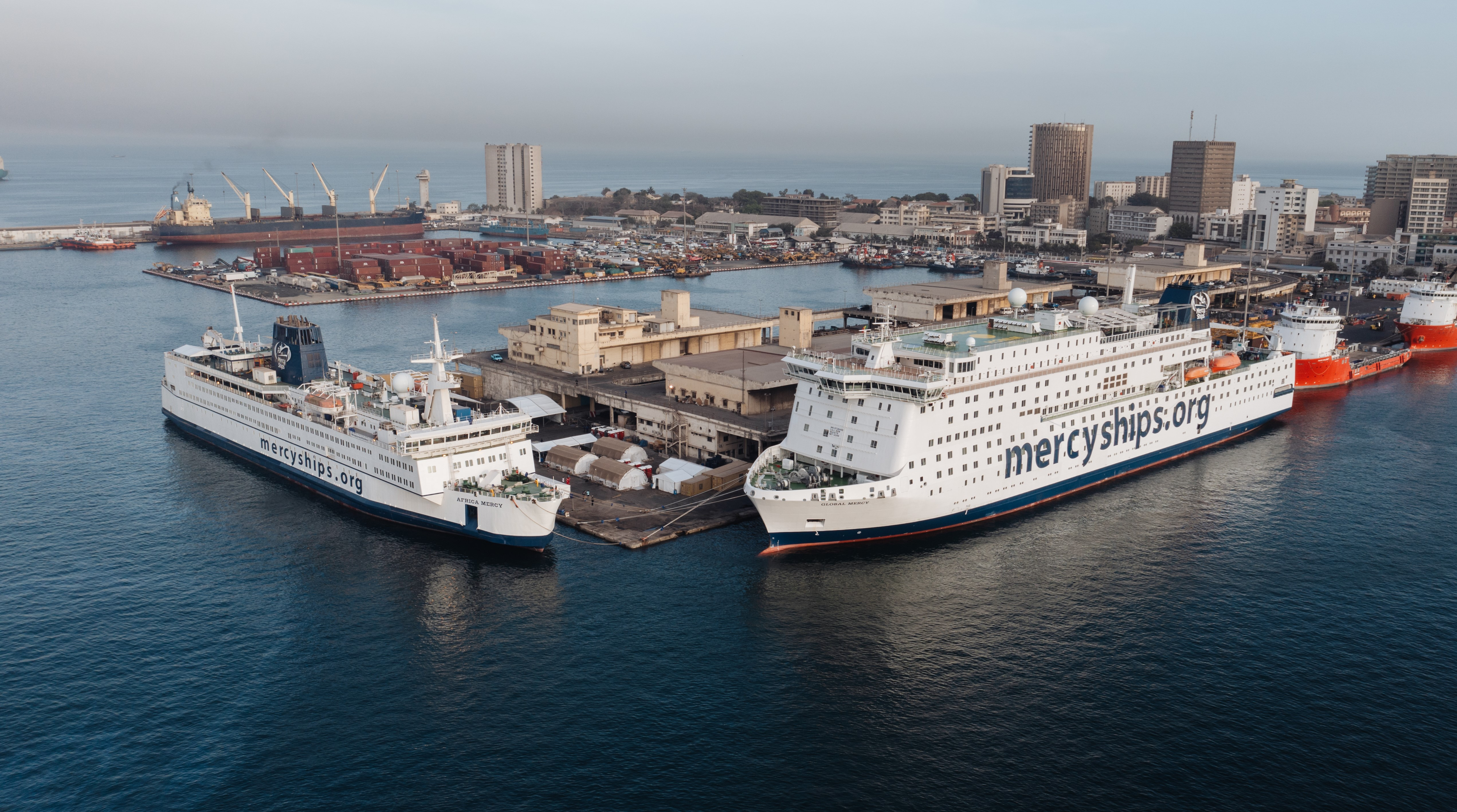On board newest Mercy Ship, African leaders commit to Dakar Declaration – a roadmap which will accelerate access to surgical, obstetric, and anesthetic care by 2030

H.E. President of Senegal Macky Sall has inaugurated the world’s largest purpose-built hospital ship and committed to accelerate access to surgical, obstetric and anesthetic care for the nations of Africa. Ceremonies commemorated more than 30 years of service in Africa. International humanitarian organization Mercy Ships and its partners in Africa used the opportunity to come together in an unprecedented and strategic effort to improve access to safer surgery across the continent through a series of milestone events.
Representatives from Cameroon, the Union of Comoros, Congo Brazzaville, The Gambia, Guinea-Bissau, and Senegal, gathered on board the Global Mercy to approve a strategic road map to improve surgical care for African nations by 2030, where an estimated 93% of sub-Saharan Africa still lack access to safe surgery.
H.E. President Macky Sall greeted the Heads of State, saying, “We, heads of states present this day, have adopted the Dakar Declaration, which is the result of the meticulous work of our ministers and experts on access to surgical, obstetric and aesthetic care. As President in Office for the African Union, I commit to bring the Dakar Declaration to the summit of heads of state and African governments.”
Gert van de Weerdhof, Mercy Ships Chief Executive Officer said, “At the end of a difficult week for Senegal and for all of us after the tragic events that happened; today, I want to greet you all on this special day here in Dakar, Senegal. The inauguration of the Global Mercy is only one part of the reason we celebrate today. Big decisions have been made here in Dakar.”
President of the Union of the Comoros, Azali Assoumani said, “I pay tribute to Senegal as well as the personnel of Mercy Ships for their commitment to this mission. I applaud this model cooperation contributing to the strengthening of our surgical, obstetric, and anesthetic systems in Africa.”
The Dakar Declaration is an historic agreement following foundational discussions from an International Symposium in Senegal held May 4 – 6, 2022 where experts and ministers of health from 29 African nations met to put forward their commitment to advancing access to surgical, obstetric, and anesthetic care. The result of the Symposium brought a fresh initiative to draft a clear path toward safer and wider access to surgical care in Africa by 2030. Symposium members shared knowledge of their countries’ surgical care situations, addressed gaps and challenges in their national surgical, obstetric and anesthetic plans, and developed new strategies for implementation and capacity building. Prior to the International Symposium, a baseline assessment was carried out with each country and evaluated by a scientific committee.
A first of its kind in Africa, this study has so far collected data about the availability, access, and operation of surgical, obstetric, and anesthetic healthcare systems in 29 of the 47 nations of WHO’s sub-Saharan African region. The survey provides critical insights into Africa’s healthcare systems from the perspective of district hospitals, particularly in the area of surgery. The World Health Organization will leverage the results of the study to complete the ongoing situational analysis of clinical and hospital services, as well as develop and finalize the regional strategy for strengthening clinical and hospital services in Africa.
The comprehensive preliminary report developed by members of the scientific committee led to the drafting of a roadmap to scale up investment in the strengthening of surgical, obstetric, anesthetic, and nursing care in Africa, in line with the Sustainable Development Goals (SDG). A draft Dakar Declaration was prepared and endorsed by the Ministers of Health and approved by visiting African Heads of State.
The new hospital ship, Global Mercy™ is 174 meters long, 28.6 meters wide and has space for 200 patients, six operating rooms, one laboratory, general outpatient clinics, a dental clinic, and an eye clinic. The hospital decks cover a total area of 7,000 square meters and contain the latest training facilities. When in full service, the ship will be able to accommodate up to 950 people when docked, including crew members and volunteers from all over the world.